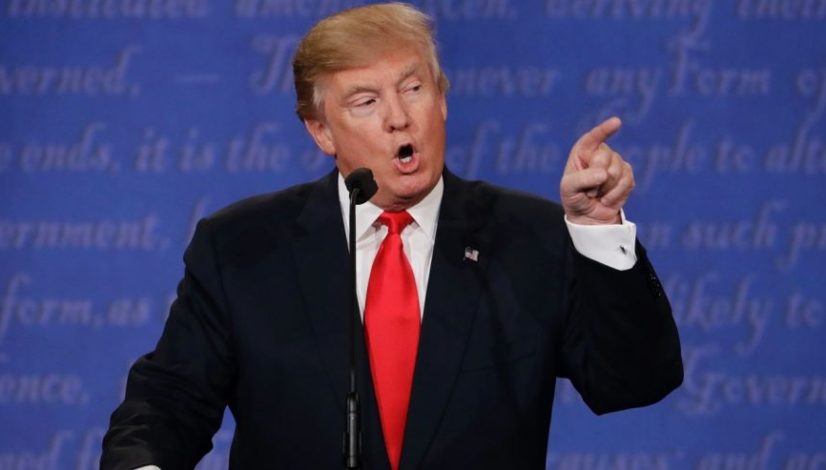Calm, informed, reasonable: Trump scores at final debate
Bottom line: in the third and final presidential debate, Trump had his best outing yet. He was calm, informed and reasonable, and managed to again put Hillary on the defensive.
He will have shored up support among conservatives by taking strong stances against abortion and in favor of gun rights. But by pressing those positions, and by not addressing family or education issues, he probably gained no ground with women, and that could cost him the election.
The drama of the debate, though, was that Donald Trump refused to guarantee that he will accept the outcome of the election. Instead, he said he would “look at it at the time,” suggesting that he might challenge the result should he suspect significant interference in the vote. Hillary Clinton excitedly denounced Trump for “denigrating democracy” and with breaking with our long-standing tradition of a peaceful transfer of power.
Trump’s position is in keeping with recent comments made to supporters that the election might be “rigged,” a refrain that concerns some party officials and voters. His running mate Mike Pence and his daughter Ivanka have both agreed to accept the outcome of the vote; why not The Donald?
Trump may be trying to gin up turn-out amongst his supporters. In the face of a barrage of negative publicity and weaker polling, Trump may fear that his backers will be discouraged, and fail to show up at the polls. The release of the new Project Veritas tape identifying actual voter fraud, and the firing of two Democratic operatives engaged in cheating, has given the issue of a rigged election actual substance. Trump has called for people to act as poll watchers, expressly to look out for signs of foul play. What could better whip up his followers than suspicions that the Clinton camp, and the DNC, is trying to fix the vote?
It’s not a crazy strategy. The entire country is alert to what has become the most aggressive media onslaught ever waged against a presidential candidate. The incessant reporting of unfavorable news about Trump, much-hyped revelations about his business dealings, the resolute reluctance to report WikiLeaks emails damaging to Hillary, the revelations about cozy relations between reporters and the Clinton camp – Trump can fairly claim that the media establishment is pitted against him.
Add to that recent reports of Democratic operatives inciting violence at Trump rallies – violence which became central to Hillary’s theme that Trump was “dangerous” and could not be trusted with the nuclear code – and there are reasons to be skeptical that the political playing field is level.
Much of the recent assault on Trump, such as the great attention paid to the video of his lewd remarks about women or the days of coverage given to his contretemps with the former beauty queen, has appeared geared to depressing turnout by Trump voters.
Hillary’s operatives are extremely concerned that her voters won’t show up because her unfavorables – like Trump’s – are so high. They have sent one emissary after another – including President and Mrs. Obama – out to goad African-Americans, Hispanics and other members of the Obama coalition into going to the polls. What’s even more effective? Making sure that Trump backers don’t show up either. So perhaps Trump is engaging in tit for tat.
Sadly, because of the media’s very real bias, Trumps’ comments will be portrayed as just more evidence of recklessness. Lost in the coverage will be mention of the Project Veritas recording or the firing of the Democrat apparatchiks. Pundits will be “dismayed” by Trump’s “whining” as President Obama described it.
Lost will be the other real news of debate: Trump is a very fast learner. The difference between his performance in the first head-to-head encounter with Hillary Clinton and the last was vast. Not only did he stay on message, but he clearly has amassed a great deal of information in a very short time. He spoke about Aleppo and ObamaCare, the economy and the Supreme Court with confidence. He will never match Hillary’s mastery of policy detail; he doesn’t need to. He just needs to sound competent, and he did.
Moreover, Hillary was not in command. She failed to answer a question about apparent pay to play while she was Secretary of State, instead ranting on about the virtues of the Clinton Foundation that was finally interrupted by Chris Wallace. No one was fooled. Republicans cheered; finally, a moderator brought up the unholy history of the Clinton Foundation.
Trump went after Hillary on the failures of policies towards Syria, Iraq and Libya. He again noted that she has been near the center of power for thirty years – time to have made some of the changes she has now promised to undertake. He again accused her and other Democrats of reaching out to blacks and Hispanics only every four years, when they need their votes. And, of course, he hit her over and over on trade, associating her with husband Bill’s “disastrous” NAFTA deal.
For her part, Hillary repeated worn lines denigrating Trump, accusing him of shipping jobs to Mexico and China by buying cheap imports for his projects (at least he created some jobs along the way), of belittling women, minorities and the disabled, of wanting to cut taxes for the wealthy, of suggesting we sunder our relations with staunch allies and of being in league with Putin.
Trump was more successful in deflecting such charges than in the past, partly because he is better informed. When Hillary was confronted with WikiLeaked comments about her dream of “open trade and open borders” she immediately revisited her meme about Putin and Trump being in cahoots. Trump noted drily “That was quite a pivot”, and indeed it was.
Will Trump’s better performance close Hillary’s lead in the polls? It may help.
Summing up, he said the country “cannot afford four more years of Obama.” That is the truth, and the most powerful message in Trump’s arsenal.
Published here.




